1. Caster frenlerine giriş
Hareketlilik çözümlerinin dinamik dünyasında, tekerlek frenleri güvenlik ve operasyonel verimliliğin sağlanmasında vazgeçilmez bir rol oynar. Genellikle gözden kaçan, bu bileşenler, endüstriyel ekipmanlardan her güne kadar çeşitli uygulamalarda kazaları önlemede ve kontrolü sürdürmede çok önemlidir. Ofis sandalyeleri. İlgili kuruluşlardan yapılan son araştırma verileri, tekerlek fren sorunları nedeniyle her gün küresel olarak binlerce kazanın meydana geldiğini göstermektedir. Bu olaylar öncelikle üç kritik faktörden kaynaklanmaktadır: aşırı yükleme, yanlış çalışma veya uygunsuz tekerlek fren tiplerinin seçimi.
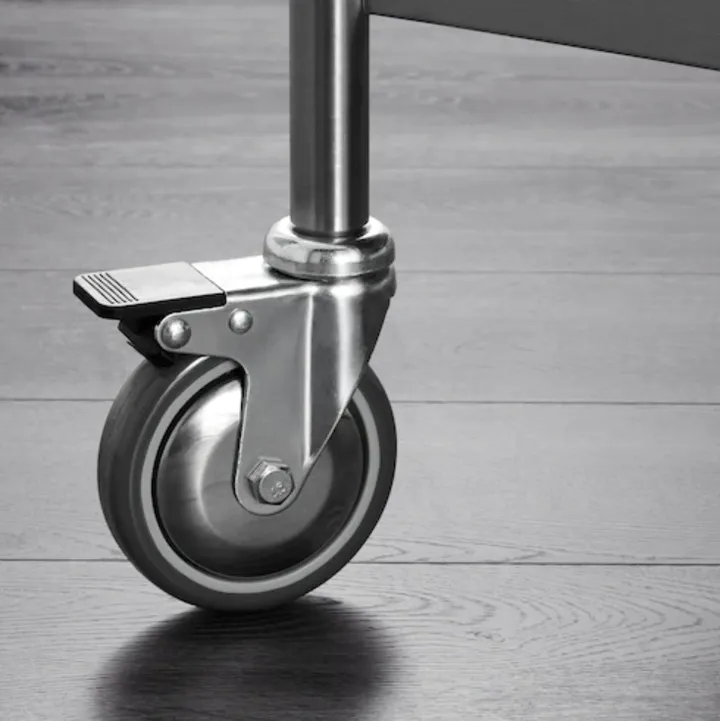
Bu içgörüler ışığında, bu makale tekerlek çarkı frenleri dünyasına derinlemesine girmeyi amaçlamaktadır. Benzersiz özelliklerini, uygulamalarını ve güvenlik yönlerini tartışarak çeşitli tekerlek frenlerini keşfedeceğiz. Her bir fren türünün farklılıklarını ve spesifik kullanımlarını anlayarak, kullanıcılar hem ekipmanın hem de operatörlerinin güvenliğini sağlayarak bilinçli kararlar verebilir.
2. Tekerlek çarkı freni türlerine ayrıntılı genel bakış
A. Toplam fren
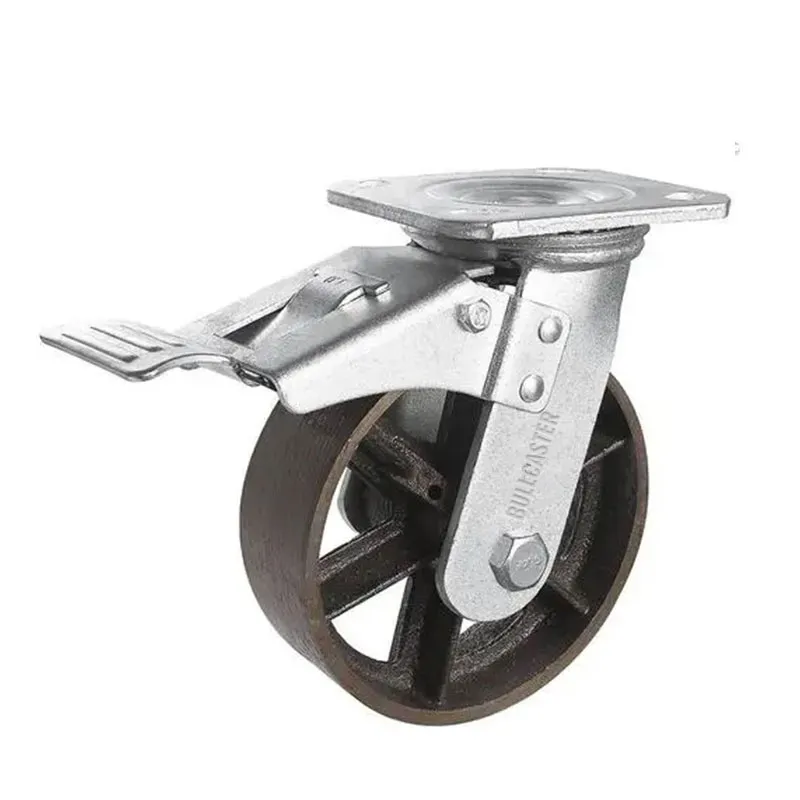
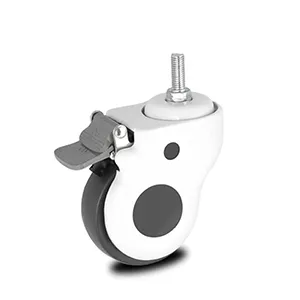
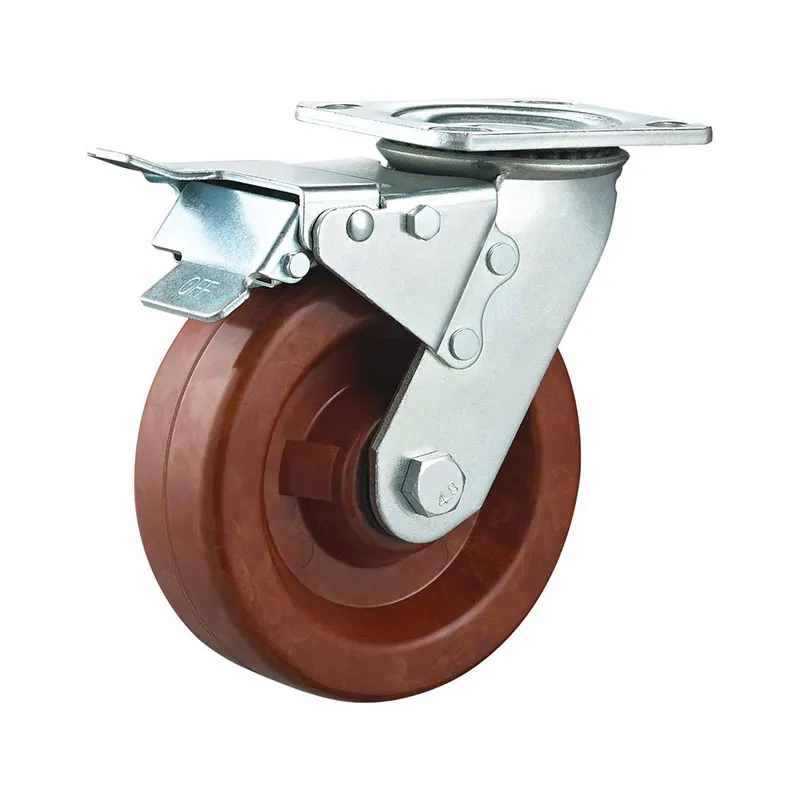
Toplam fren sistemi, benzersiz güvenlik ve stabilite sunan tekerlek çarkı freni teknolojisinin özetini temsil eder. Bu mekanizma, nişanlandığında hem tekerleğin dönüşünü hem de yön hareketini kilitler ve tekerleği tamamen hareketsiz hale getirir. Bu özellik, mutlak istikrarın tıbbi tesislerde olduğu gibi pazarlık edilemez bir gereklilik olduğu ortamlarda özellikle çok önemlidir. ağır hizmet Endüstriyel uygulamalar. Toplam frenlerin yapımı tipik olarak galvanizli çelik, naylon veya paslanmaz çelik, dayanıklılık ve uzun vadeli güvenilirliğin sağlanması. Ayrıca, bu frenler, farklı kullanıcı tercihlerine ve uygulama senaryolarına hitap eden sol ve sağ frenler, A/B frenleri ve yukarı ve aşağı frenler dahil olmak üzere çeşitli tetik tiplerinde gelir. Tasarımdaki çok yönlülük ve güvenlik güvencesi, toplam frenleri en yüksek güvenlik ve kontrol seviyesini talep eden uygulamalar için bir seçim haline getirir.
B. Tek Fren
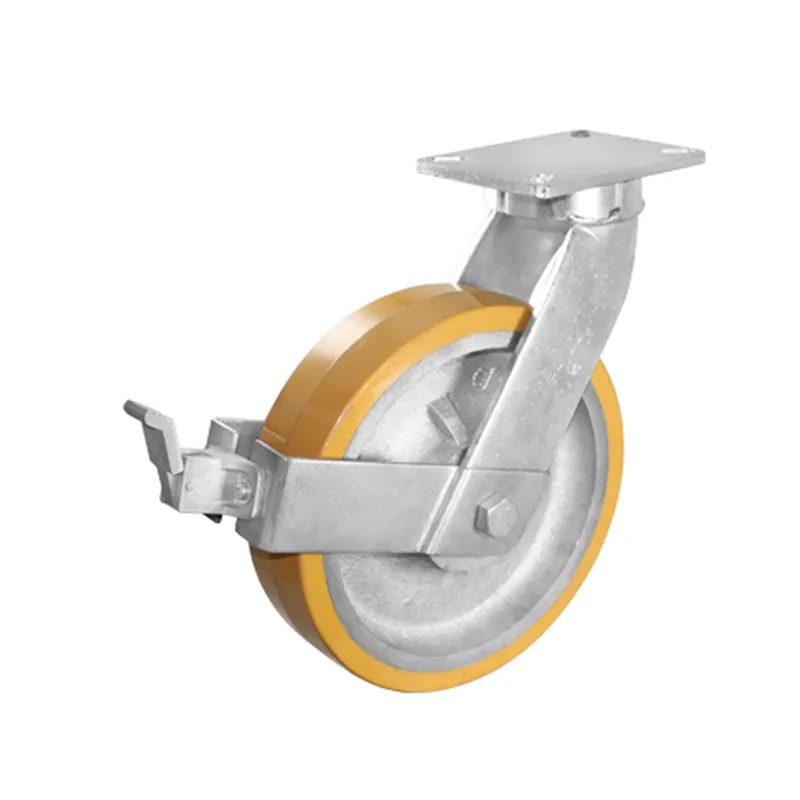
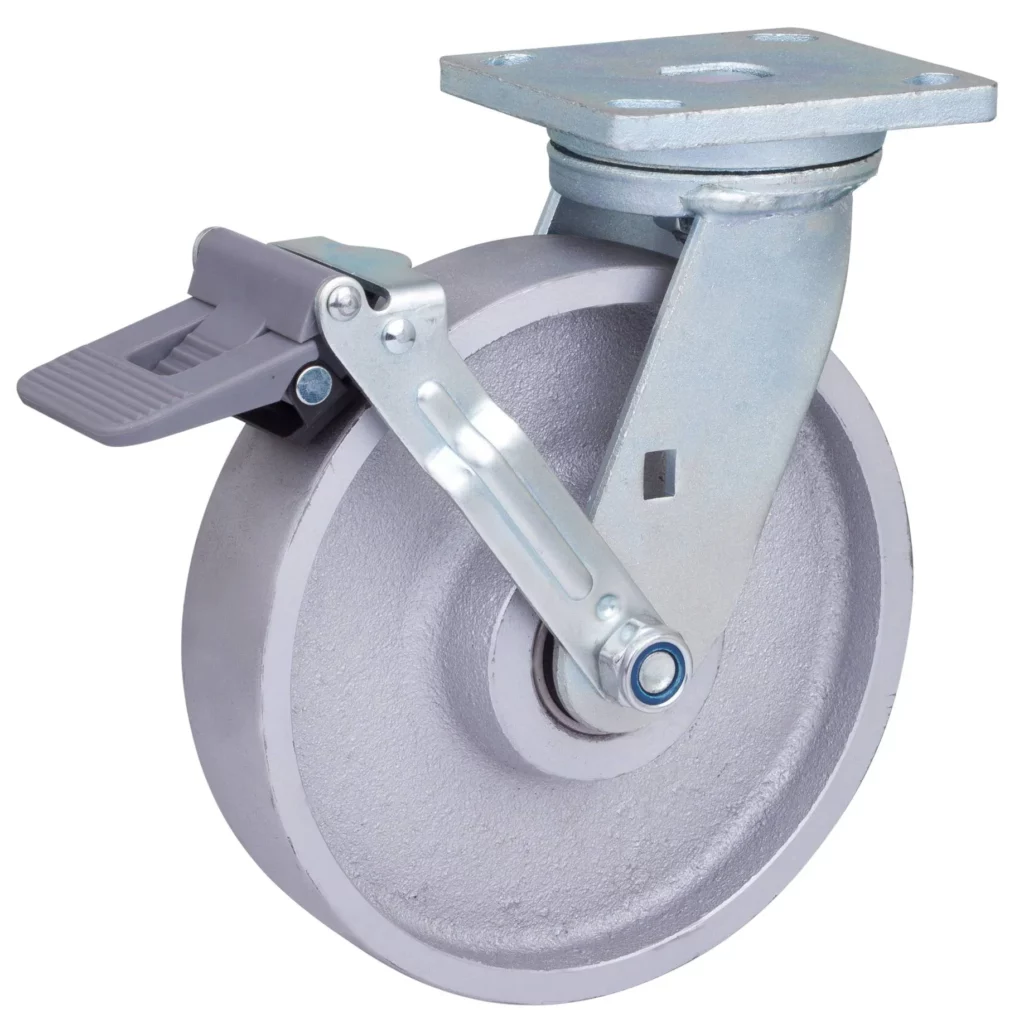
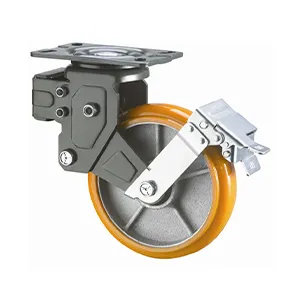
Operasyonel sadeliği ve esnekliği ile karakterize edilen tek fren sistemi, tekerlek fren ailesinde bir başka hayati tiptir. Bu sistem, tekerleklerin dönmesini kilitler ve tekerleğin yönünün ayarlanmasına izin verir. Bu ikili işlev, hareketlilik ve istikrar arasında, yön ayarlarının sık olduğu ancak kazara hareketin bir risk olduğu ortamlar için uygun bir denge sunar. Bununla birlikte, bu esneklik dikkatli bir şekilde çalışmayı gerektirir, çünkü uygunsuz kullanım kazalara yol açabilir. Tek fren sistemi, kullanıcıların güvenliği sağlamak için yük ve araziye dikkat etmelerini gerektirir. Tek frenin nüanslarını keşfederken, riskleri en aza indirirken etkinliğini en üst düzeye çıkarmak için ideal uygulamalarını, işleme tekniklerini ve güvenlik ipuçlarını araştıracağız.
C. Yan Fren
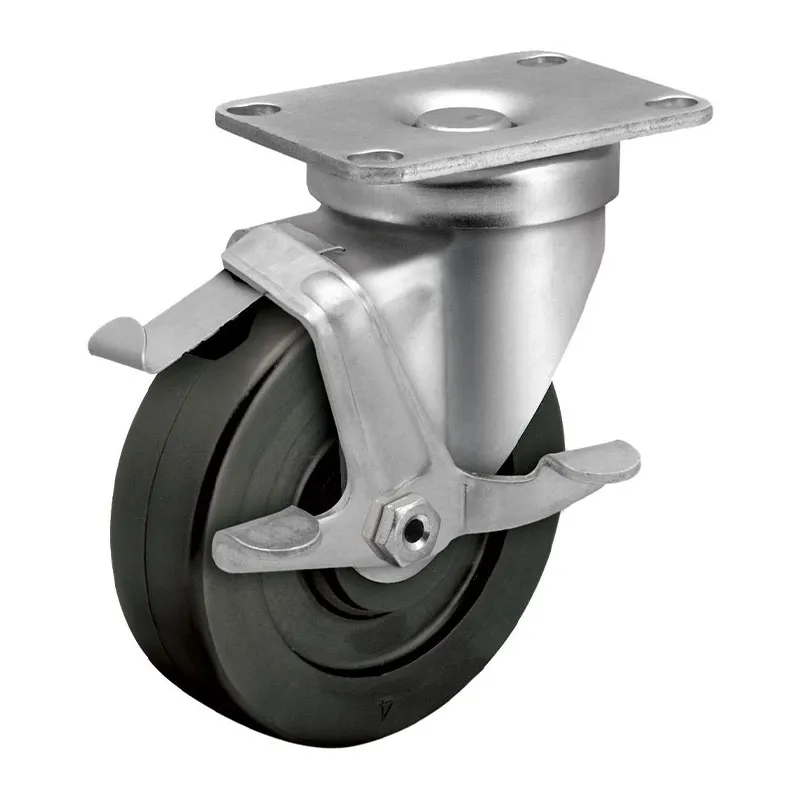
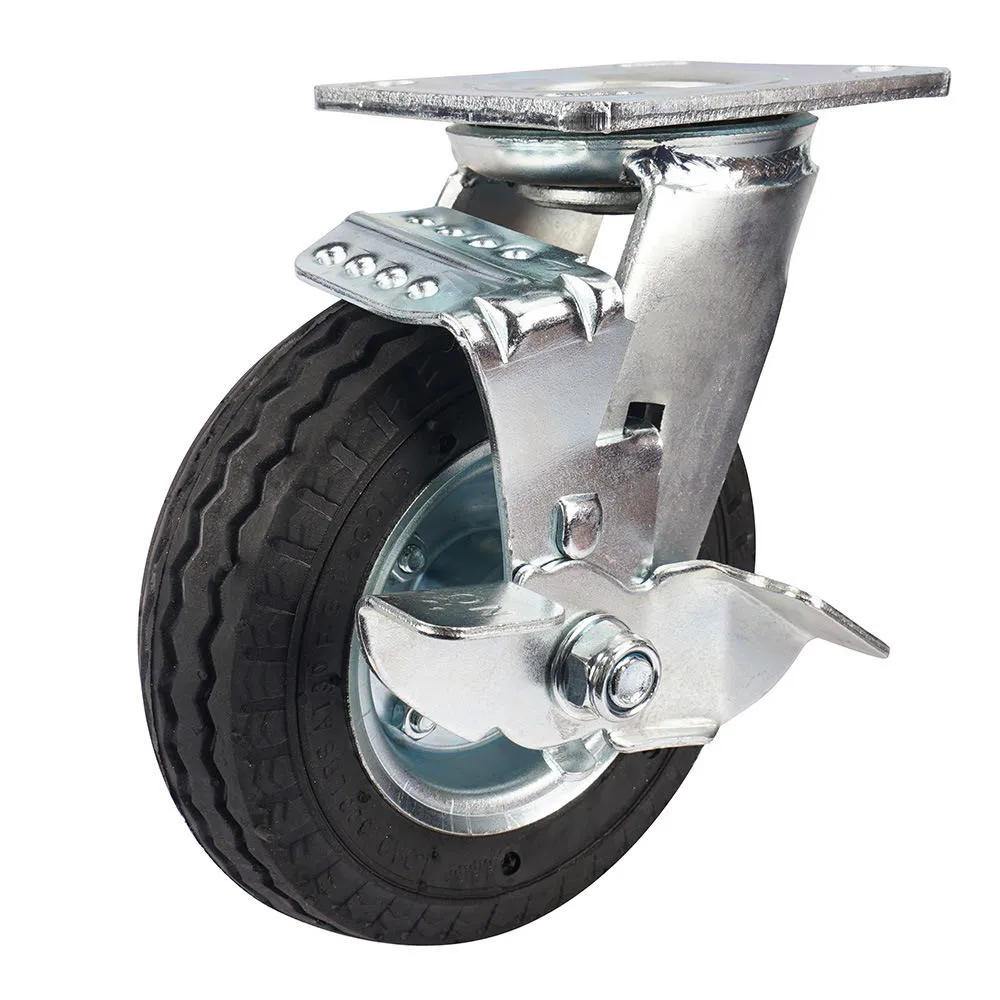
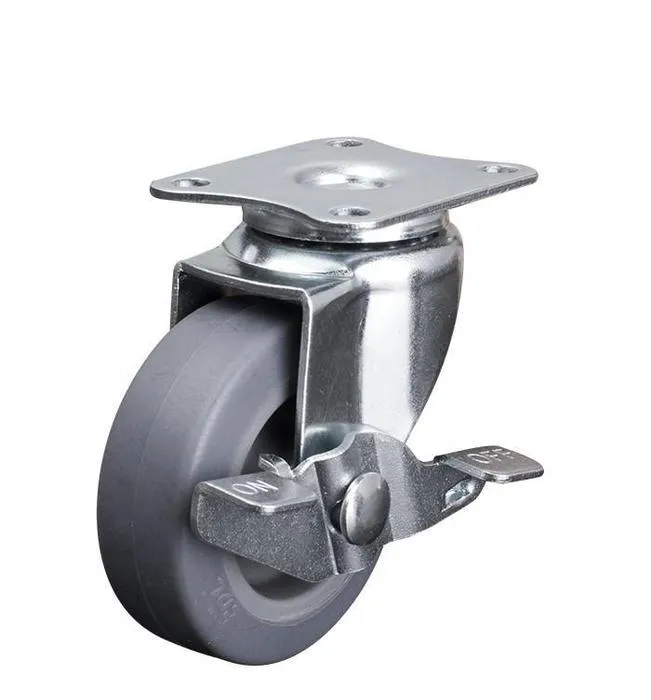
Yan fren ergonomik tasarımı ve gelişmiş estetik çekiciliği için öne çıkıyor. Caster'ın yan tarafında yer alan, bir ayakla kolayca etkileşime girerek, mutfak arabalarında veya kütüphane arabalarında olduğu gibi elsiz çalışmanın tercih edildiği ortamlarda kullanıcı dostu bir seçenek haline getirir. Yan frenin ek avantajı, fren mekanizmasını döndürme ve gizleme, böylece tekerleğin genel görünümünü iyileştirme ve kazara açma veya aktivasyon riskini azaltma yeteneğidir. Toplam frenle karşılaştırıldığında daha az toplam kilit güvenliği sunsa da, yan fren, özellikle estetiğin ve kullanım kolaylığının önemli hususlar olduğu uygulamalarda mükemmel bir güvenlik ve rahatlık dengesi sağlar.
D. döner kilidi
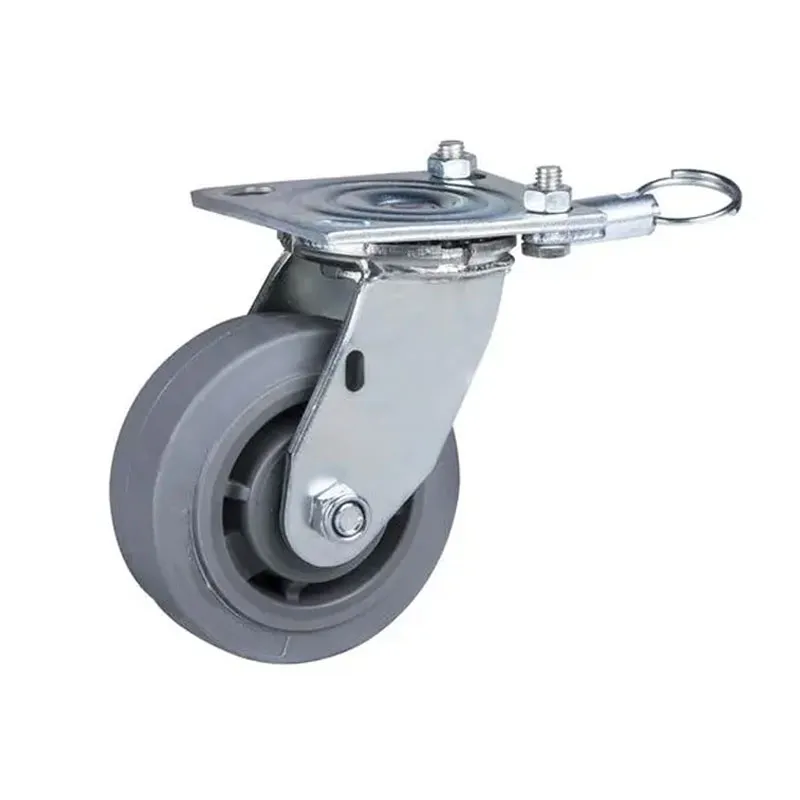
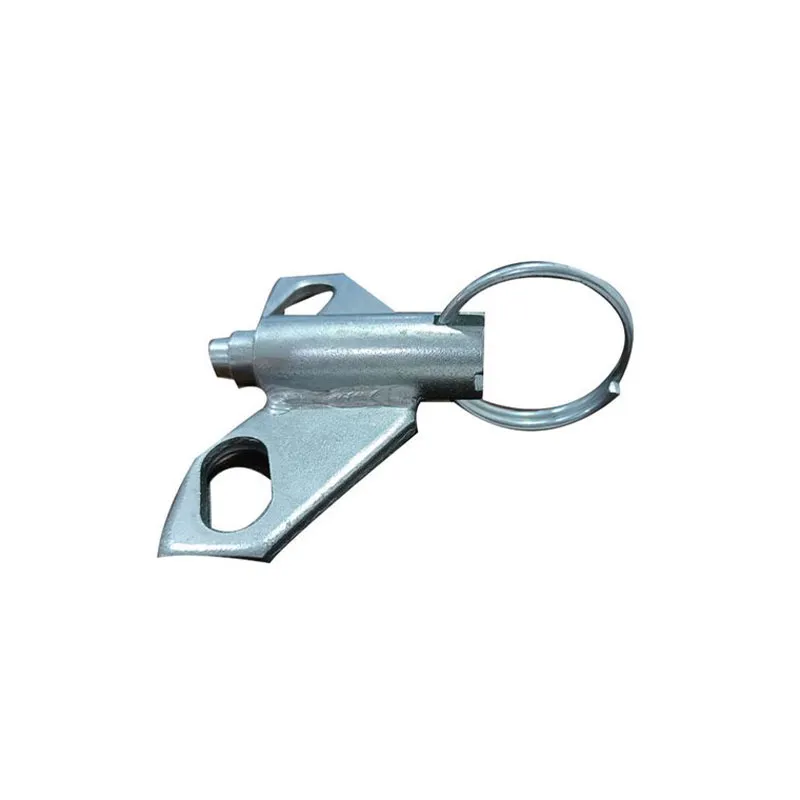
Döner kilitler, özellikle Caster tekerlek işlemlerinde hassasiyet ve kontrolün bel kemiğidir. ağır hizmet uygulamaları. Bu mandal tipi kilitleme plakası, direksiyon fonksiyonunu kilitleyerek tekerleğin döner plakasına ekler. Bu özellik, yönlü stabilitenin ağır makineler veya endüstriyel ekipmanlar gibi hareketsizleştirme kadar önemli olduğu ortamlarda çok önemlidir. Döner kilitler genellikle esneklik ve kontrol kombinasyonu sunan tek frenlerle birlikte kullanılır. Bu sistem özellikle hareket ve stabilitedeki hassasiyetin güvenlik ve operasyonel verimlilik için çok önemli olduğu ağır yüklerin yönetilmesinde etkilidir. Döner kilitleri incelerken, tasarımlarını, uygulamalarını ve ağır hizmet tipi tekerlek operasyonlarına getirdikleri ek güvenlik katmanını keşfedeceğiz.
E. Caster Merkezi Kilitleme Sistemi
Blickle caster central locking systemMerkezi kilitleme sistemi, tek bir kontrol mekanizması yoluyla aynı anda birden fazla tekerlek frenleme yeteneği ile karakterize edilen tekerlek teknolojisinde devrim niteliğindedir. Bu sistem, özellikle hastane cihazlarında veya ekipman arabalarında olduğu gibi, özellikle birkaç tekerlek kilitini koordine etmenin gerekli olduğu uygulamalarda hem güvenliği hem de rahatlığı büyük ölçüde artırır. Merkezi fren sistemi işlemleri kolaylaştırır, bu da ekipmanı güvence altına almayı kolay ve daha hızlı hale getirir. Daha yüksek maliyetine rağmen, özellikle verimlilik ve güvenliğin çok önemli olduğu tıbbi ve üst düzey teknoloji sektörlerinde popülaritesi artmaktadır.
3. Fren tekerlekleri nasıl seçilir
Bir tekerleğin doğru frenini seçmek, ekipmanın güvenliğini ve işlevselliğini büyük ölçüde etkileyen kritik bir karardır. Ayrıntılı genel bakışımızda verilen içgörülere dayanarak, doğru tekerleğin frenini seçmede size rehberlik edecek temel hususlar şunlardır:
- Uygulama gereksinimlerini değerlendirin: Başvurunuzun özel gereksinimlerini değerlendirerek başlayın. Toplam frenler çoğu durumda en yüksek güvenlik seviyesini sağlar.
- Operasyonel kolaylığı düşünün: Kullanım kolaylığının perakende veya misafirperverlik gibi bir öncelik olduğu ortamlarda, yan frenler uygun, ayakla çalışan bir çözüm sağlar. Özellikle ahizesiz operasyon ve estetiğin gerekli olduğu durumlarda yararlıdırlar.
- Yükü ve araziyi anlayın: Yükün ağırlığı ve türü ve tekerleklerin kullanılacağı arazi anahtar faktörlerdir. Döner kilit + tek fren, hassas hareket ve stabilite gerektiren ağır hizmet uygulamaları için idealdir, merkezi fren sistemi ise genellikle tıbbi ve yüksek teknolojili ortamlarda kullanılan ağır yükler altında birden fazla tekerlek senkronize etmek için en iyisidir.
- Malzemeler ve dayanıklılık: Fren malzemesinin kullanım ortamınız için uygun olduğundan emin olun. Galvanizli çelik, naylon veya paslanmaz çelik gibi malzemeler, uzun ömür ve tutarlı performans için kritik olan değişen derecelerde dayanıklılık ve hava direnci sunar.
4. Özetleme
Tekerlek çarkı frenlerinin bu kapsamlı keşfinde, her biri benzersiz işlevleri ve uygulamaları olan çeşitli fren tiplerinin manzarasını geçtik. Toplam frenlerin sağlam güvenliğinden, yan frenlerin ergonomik rahatlığına ve döner kilitlerin hassas kontrolünden merkezi fren sistemlerinin yenilikçi verimliliğine kadar, doğru tekil fren seçiminin herhangi bir hareketlilik çözümü.
Şu tarihte: bulcaster, we understand that the selection of a caster wheel brake is not just a matter of preference but a critical decision impacting safety, efficiency, and productivity. Our commitment to innovation, quality, and customer satisfaction is evident in our wide range of caster brakes, designed to meet the diverse needs of various industries and applications. Whether you’re in the medical field, technology sector, or any industry requiring reliable mobility solutions, Bullcaster offers top-tier products tailored to your specific needs.
Reach out now and experience the Bullcaster difference in quality and innovation. Let us be your partner in crafting mobility solutions that push the boundaries of safety and efficiency.


